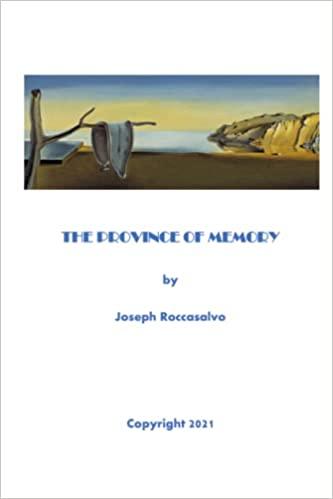We say that the style is the man. Style as the soul of wit and wisdom is the person. The aphorism points to this memoir’s author, Joseph Roccasalvo: refined, astute and ironic. Readers will envision him moving at a slight angle to family and friends, exuding his intelligence to wide benefit. He is at once scholar and believer. Although the events of his life may enlarge on his attainments, we value him best for his faith and hope. Like his namesake, Joseph, he’s accounted a blessing.
Error message
Deprecated function: Array and string offset access syntax with curly braces is deprecated in include_once() (line 20 of /home/y1huhq0xqdnt/public_html/includes/file.phar.inc).- Dear Joseph, I took some time this morning to read “The Province of Memory.” What strikes me about your work is that it resonates with your current situation. Whether a poem, essay, short story or novel, you vibrate around a central theme. Once you have discerned it, it takes over all aspects of your life. And then you have this uncanny ability to piece it all together in one harmonious whole. It gestates just long enough until you feel satisfied and then you let it out in the world, so it stands on its own. Any more waiting would be excess, any less would be unjustified. This relationship is akin to parents and their offspring as they cross into adulthood. Or perhaps closer to home, a mentor and his protege. As a friend of nearly twenty years, I have had the unique position of watching this process unfold multiple times. I see it coming with every conversation we have, and I am always astonished how you are able to encompass it and story-tell. This one, dare I say, I might have even had a small hand in: helping to implant the thought of friendship that gave it birth. While I believe others have explored talking to their younger selves, only you, Joseph, can do it without pity or self-regret—feelings many people have looking back on their work. Your fiction is the volume of your life. How might two old friends have a conversation with their younger selves about how they have changed with time? I may be biased but most of this hits home at our relationship. It’s more of your honest writing. This quote I will keep close: "We knew we had chosen well because we challenged one another to become better. Still, age was inconsequential, honesty was not: we told one another what we needed heard and not what we wanted said. We risked separation by telling the truth with candor." You have always given me a model for friendship through your actions and inactions. Now you have given it to me through words. No doubt I will recall this on our separation at death. For this I will be eternally grateful. Steven
- Dear Joseph: As to your reflective piece, I thought it was an excellent 'review' of your life and thoughts along your way. It all made sense to me, as we have talked about many of the issues as you ran into them. As to whether you share this with Joan, it would depend, I think, on how much you can distance yourself from reacting to her response, whatever that may be. It might also be a 'test' to understand how she has developed, or matured, in her understanding of how life goes. There's always a bit of a risk in sharing your innermost being with another person. For me, there has to be a trust that the other person can receive what I have to offer. If I don't perceive that ability is actually there, I try not to judge, and just keep things to myself. Think about it—she may also surprise you. Again, please forgive the delay. You wrote a beautiful piece about your life and I thank you for sharing it with me. God bless. I had occasion to dive into my early journals last night (was trying to remember someone's name) and when I closed them, the song from Gigi came to mind: 'I'm glad I'm not young anymore'. Sending lots of love your way, Maureen
- Dear Joseph, Thank you so much for sharing this sequel to your memoir. Ultimate reflections, as it were , in several senses. I evoke only one of many poignant strains: "Can one foster an affair of the heart when God in prayer is the central lover?" (page 4). This is an issue that Cynthia Bourgeault, among others, has forcefully addressed, especially in her book on Mary Magdalene. How strange, tragic, and counterintuitive to the Incarnation, that singlehearted love of God is always deemed in competition with an authentic human love. God is the Love not only beyond but in All, the Love that engenders, facilitates, and animates all love. Then, towards the end of your reminiscences, you suggest that love of your art is indeed incompatible with other engrossing commitments. Very sobering. You rightly point out that Fra Angelico seemingly found no conflict; but, rather tempestuously, Thomas Merton certainly did. Enjoy the summer, and all the fertile energies still swirling within you. Warmly, Michael
